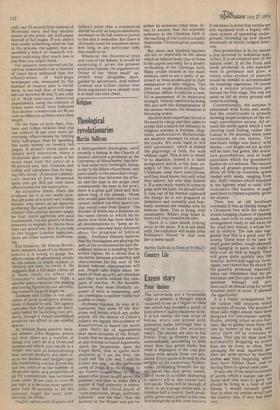Religion
Theological revolutionaries
Martin Sullivan
A distinguished theologian, until recently a bishop in the Church of Ireland, and now a professor at the University of Manchester, has lately had some very forthright things to say to his fellow churchmen, and particularly to the parochial clergy. He believes that between the scholar and the man in the pulpit (and consequently the man in the pew), there is a great gulf fixed and that before long, if not already, "those who would pass from hence to you cannot; neither can they pass to us, that would come from thence". The Warden of Keble has a footnote on the same theme in which he laments how little has been done by all denominations to "keep an increasingly educated laity informed about the progress of biblical study." Professor Hanson believes that the theologians are playing the part of the revolutionaries and the ordinary believer is standing for the ancien regime. He is afraid that in the battle between scholarship and obscurantism for the soul of the British believer, obscurantism will win. People take fright when the bases of their security are attacked and they scuttle behind the ramparts of reaction. At the moment, however, they seem blissfully unaware of what is happening, and the theologian is neither visible nor audible to them.
Professor Hanson, by way of illustration, lists some of the doctrines and beliefs which are under attack. All the stories of Christ's infancy are legend; the evidence of Resurrection is based far more upon Paul's list of Appearances than upon accounts of the Empty Tomb; that we should look askance at any attempt to found arguments about the Incarnation upon the Virgin Birth; that to quote such sentences as 'I am the Way, the Truth and The Life' and 'I and the Father are one', as the ipsissimaverba of Jesus, is to do despil, to the Fourth Gospel;,that to t1471?"1&o.-. assess what Jesus taught about the problem, and then to make this a matter of final authority is impossible; what did Christ know of "over-population, drugs, pollution, inflation", and the like? That the Sermon on the Mount was put to
gether by someone other than Jesus; to assume that the supreme authority in the Christian faith is the teaching of Our Lord is a highly disputable Christological assumption.
But these and kindred matters are not so important as the issues which lie behind them. One of these is the urgent necessity for a drastic re-thinking of the Christian faith. Many people trained in the exact sciences need to see a unity of approach in these.studies and in their examination of their religion. This does not mean dismantling the Christian edifice. It calls for a careful re-assessment of its structural strength. Nobody seems to be doing this and with the disappearance of the serious sermon, the situation is becoming worse.
Another more important factor is the need by clergy and laity alike to accept that a search for certainty in religious matters is fruitless. Dogmatic authoritative declarations are abortive attempts to cover up the cracks. We must learn to live with uncertainty, which is indeed the pilgrimage of faith, the walk without sight. This is not to doubt ' or to abandon; indeed it is blind acceptance which is the best example of this state of despair. Christians must have convictions, and they must know, not only what they believe, but why they believe it. If a man really wants to come to grips with his faith, he should boldly take out of his mental cupboard the things he is not prepared to disbelieve and honestly and fearlessly examine the reasons why he believes them. This is living with uncertainty. Where your heart is, there will your treasure be also.
There is a time bomb ticking away in the pews. If it is not dealt with, the explosion will make John Robinson's Honest to God look like a damp squib.
Martin Sullivan is Dean of St Paul's



























 Previous page
Previous page